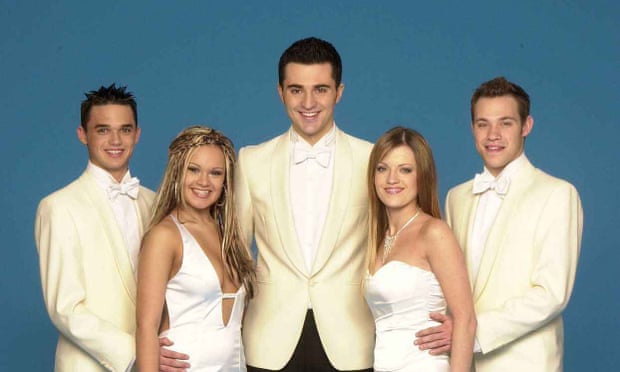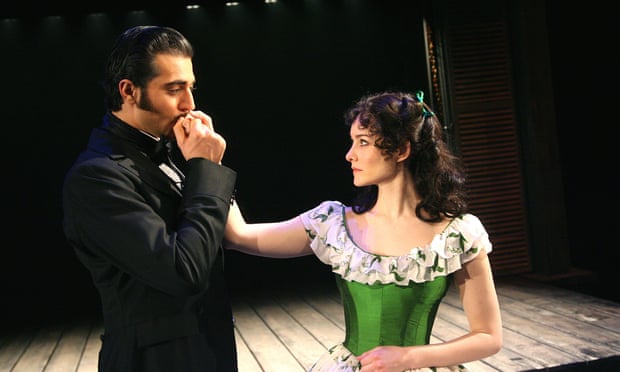In the embryonic days of UK TV talent shows, Darius Campbell Danesh – whose death at the age of 41 was announced on Tuesday – did two genuinely revolutionary things. Firstly, he succeeded in making a song his own – the holy grail of TV talent shows – via his gloriously OTT rendition of Britney Spears’ Baby One More Time on Popstars in 2001. Dressed somewhere between a roll-necked Steve Jobs and a swashbuckling musketeer, he became the instant star of a show that spectacularly failed in its remit to create stars.
For his second trick, he re-emerged later that year looking like a matinee idol and singing like Elvis to finish third on Pop Idol and later land himself a UK No 1 single with Colourblind. Reality TV is all about narratives and often they can build up around people and solidify like cement; somehow, via an alluring mix of naivety, panache and genuine talent, Darius was able to rewrite his.
Such was his impact on the nascent TV talent show genre, that all subsequent spin-offs tried to find their own Darius Campbell Danesh. Someone who was faintly ridiculous, disarmingly good-looking, with just a pinch of enough self-awareness to make it work. The problem, however, is that all the elements have to be perfectly balanced, and often oversized characters, the kind that ironically make properly great pop stars, aren’t destined to win money hungry, tent-pole TV shows.

“If I’d won I would have been the biggest nightmare,” Darius told the Guardian in 2002, shortly after losing to Gareth Gates and eventual Pop Idol winner Will Young. “I wouldn’t have fitted the mould. If I’d won, either the Pop Idol logo or I would have imploded. I have to be the person I am.”
While Will Young stood out for talking back to Simon Cowell during the show, it was Darius who turned down Cowell’s post-Pop Idol offer of a record deal with BMG, one that came with the caveat of having to record various cover versions.
“Imagine, I could have done a cover of Gareth’s cover of Robson and Jerome’s cover of the Righteous Brothers,” he said. “How great! You know, that doesn’t inspire me.” Instead he signed to Mercury Records and co-wrote his 2002 debut album, Dive In, with the likes of Steve Lillywhite (The La’s, Travis) and The Matrix (Avril Lavigne, Ronan Keating). Across two big-label albums Darius scored five UK top 10 singles without ever releasing a cover.

Born in Glasgow to a Scottish mother and Iranian father, Darius eschewed the stage school route in favour of grandstanding performances in avant-garde operas (he’d later return to opera after winning 2010’s Popstar to Operastar). Switching then to pop in a restrictive TV talent show format often meant he couldn’t quite be contained, with even his post-rejection monologue to his Popstars rivals coming across like a scenery-chewing, gloriously passionate sermon.
“It’s just not our time, that’s it,” he mused, surrounded by tearful faces. “We’ve all got talent. How much love is there in this room? I feel so much energy from your guys. There’s nothing to lose from this.” Aware, perhaps, that fame’s 15 minutes were ticking down, Darius relished his status as the country’s most famous tryer, appearing on multiple covers of Heat magazine.
But, crucially, there was always a sense he knew the game he was playing. As Lucie Cave, the editor in chief of Heat magazine and the Heat brand, put on Instagram in tribute: “He really got the joke and always had a wry smile whenever he answered questions about being a serious musician.”
A key part of the Darius story arrived during Popstars via a promise he made to the judge “Nasty” Nigel Lythgoe. On his way out of the show, the then 21-year-old calmly announced he would have a platinum album by the time he was 35. That it wouldn’t be the last Lythgoe would hear from him.
Years later this kind of bravado on the shows that followed would ring hollower than a Louis Walsh compliment. But for Darius, it was something he was going to make happen. Even Lythgoe felt it. “Darius is a survivor in life,” he said on the show. “And Darius will do whatever Darius has to do to survive. And it wouldn’t surprise me if Darius does get a platinum disc in the next five years.”
By the end of 2002, Darius had scored a UK No 1 with the Radio 2 classic Colourblind, landed a top 10 album and was briefly rivalling the established soft-pop dominance of Ronan Keating and Robbie Williams. That he then went on to write a Sunday Times bestseller (2004’s memoir Sink or Swim), appear in multiple West End productions (including Chicago and Gone with the Wind), and become a Hollywood producer is testament to a journey from tryer to survivor to established success story quite unlike any we’ve seen in TV talent show history.
Stay connected with us on social media platform for instant update click here to join our Twitter, & Facebook
We are now on Telegram. Click here to join our channel (@TechiUpdate) and stay updated with the latest Technology headlines.
For all the latest Music News Click Here
